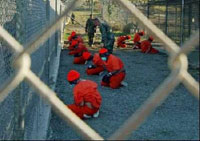CIA widely uses hoods, ‘white noise’ and sleep deprivation to torture suspects
The US House of Representatives approved legislation to bar CIA agents from using waterboarding during the questioning of suspected terrorists, drawing a veto threat from President George W. Bush.

Pravda.Ru has interviewed Professor Richard J Aldrich, Department of Politics and International Studies University of Warwick, to find out more about present-day situation with tortures in the USA.
Pravda.Ru: Are there any other legal ways of getting information from terror suspects?
Richard Aldrich: Suspects should always be persuaded to talk voluntarily. This is not only for reasons of law and morality, but also because information given freely is more likely to be true. Under pressure from torture, even of a mild kind, suspects may say anything in order to seek relief. An intelligence professional, with perhaps ten years of experience will normally pride himself on being able to get a suspect to talk without physical pressure. This has tended to be the British approach.
The most famous example was Colonel Robin "Tin Eye" Stephens, an MI5 officer who wore a monocle and ran the camp where MI5 detained hundreds of foreign spies during the Second World War. He was willing to use threats - but not force - because he claimed did not work. Very few spies held out against him. However, the British have not always been so gentle. In the First World War, British intelligence officers working in the Middle East would sit their own agents on an 'electric carpet' when questioning them. If they suspected them of lying they would subject them to two or three electric shocks through the legs and pelvis.
Pravda.Ru: What other kinds of tortures are used by US special services?
Richard Aldrich: In many different countries, the most common sort of torture is sensory deprivation. This can involve using hoods on prisoners for long periods before interrogation. It often includes a sound machine which produces "white noise", a disturbing high pitched sound. Stress positions might also be used. Often little food or drink is given. Most commonly detainees are deprived of sleep. Although this leaves few physical signs, it can be very damaging psychologically. The European Court has declared it to be illegal.
Torture, including sensory deprivation, has become widespread around the world for two reasons. First, the "War on Terror" has produced many thousands of suspects and yet there are few skilled interrogators. Therefore suspects end up being handled by the sort of people who worked at Abu Graib, part-time soldiers with little training and limited intelligence. Second, soldiers in all modern armies are subjected to mock interrogations during training, so that they know what they might endure if captured. This counter-interrogation training is often all they know about interrogation. It was never expected that they would draw on these experiences in this way and use the techniques themselves.
Some American intelligence officers have claimed that they have obtained vital information through torture. However, this ignores the wider point made by Sir Richard Dearlove, former Chief of MI6, that this has cost America the moral high ground. For every person tortured, we loose other voluntary informants who do not come forward because they are frightened or disgusted. Trust, not fear, is the most valuable weapon for an intelligence officer. Torture is not only immoral and illegal, it is also ineffective.
Prepared by Alexander Timoshik
Pravda.Ru
Subscribe to Pravda.Ru Telegram channel, Facebook, RSS!


